Did Joan Fontaine despise Olivia?
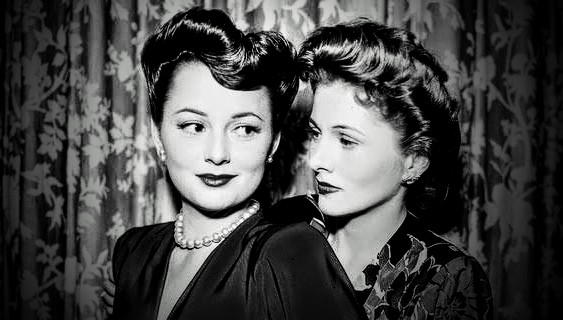
— Tim
February 1
He was a close friend of Franklin and Eleanor.
His name is sometimes brought up in connection with Errol’s.
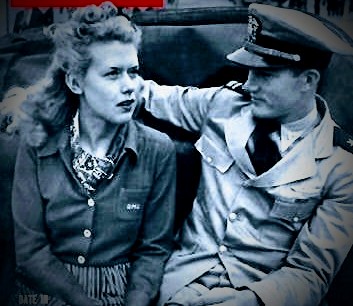
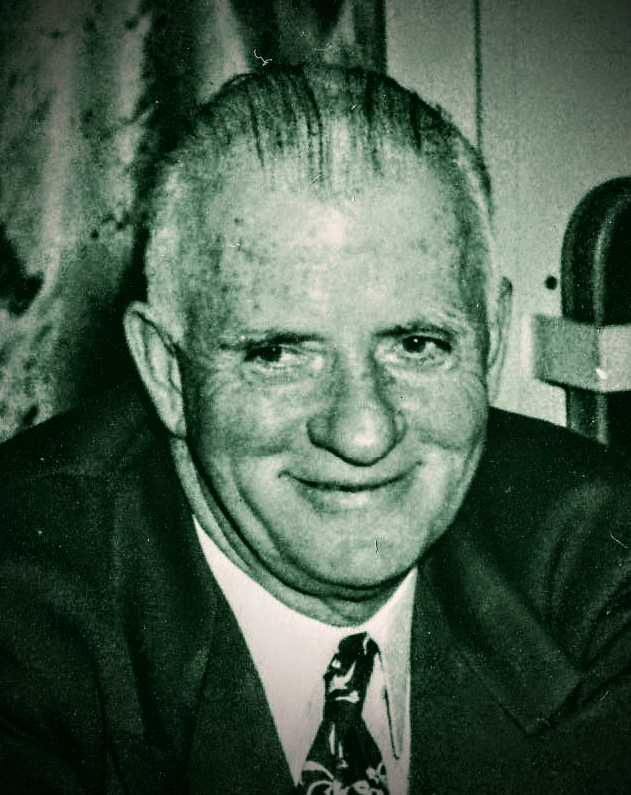
— Tim
January 31,1939
Jimmy Fidler
San Francisco Chronicle
Errol Flynn’s not subject to sea-sickness, but when you mention that yacht of his, he shows some of the same symptoms.
…
December 28, 1938
New York Times
Errol Flynn, Irish motion picture actor, faces the loss of his $25,000 yacht Sirocco because it exceeds tonnage and length limitations imposed by the Federal government on alien-owned craft…

Sirocco, off Cape San Lucas, Baja California, during one of Errol’s fishing trips.
— Tim
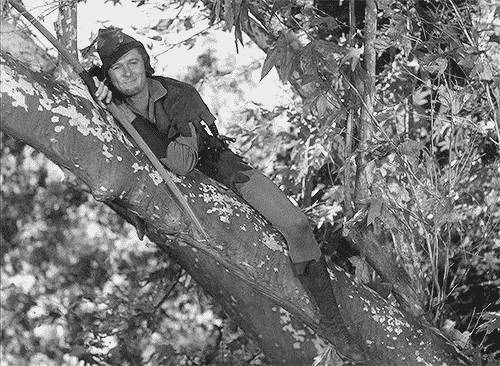
January 31, 1936
I Cover Hollywood
Lloyd Pantages
Los Angeles Examiner
Errol Flynn will do Robin Hood for Warners before he begins The Charge of the Light Brigade, which should be good news for the public. Overnight, after his one picture, Captain Blood, he’s become a worldwide sensation.
…
Errol in Charge: Out of the Woods and Into the Desert
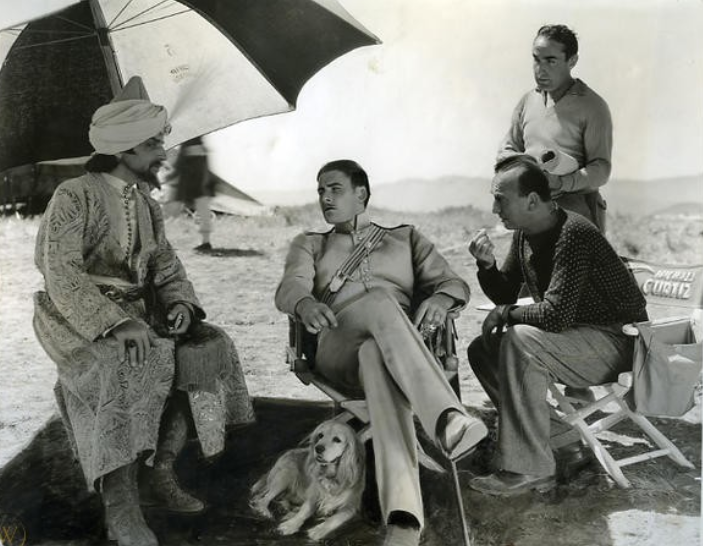
— Tim
January 30, 1937
Premire of The Good Earth
Joan Crawford with Franchot Tone..
Surprise arrrival of the evening was this.. Lili Damita with Bruce Cabot!
Miss Data has been reported reconciled with Errol Flynn, and Cabot reconciled with Adienne Ames.
…
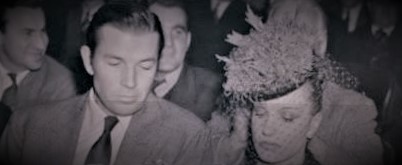
Bruce Cabot and Tiger Lil’ circa the World Premier of The Good Earth
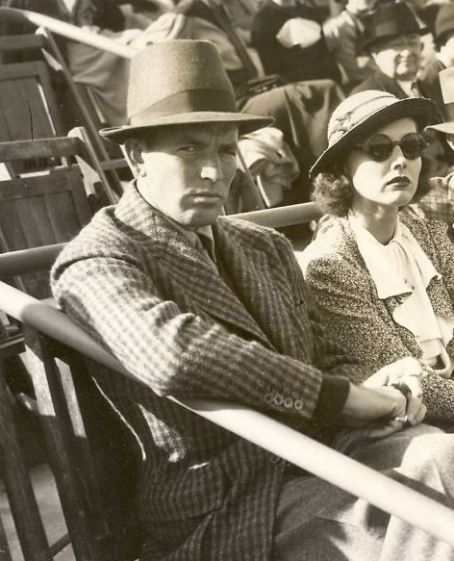
Bruce Cabot and his wife, Adrienne Ames, apparently having a not-so-happy day at the track
…
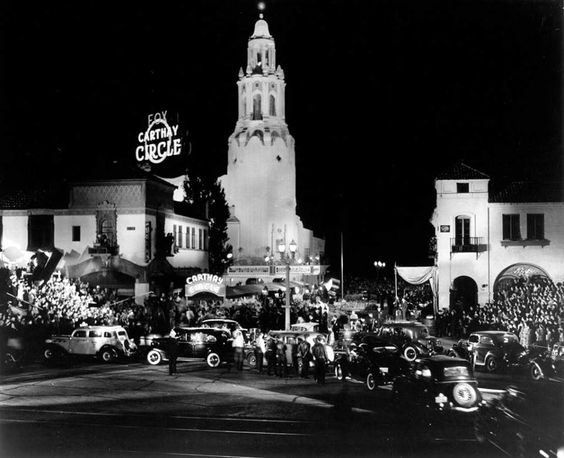
“The film’s premiere took place in Los Angeles at the Carthay Circle Theatre on 29 Jan 1937, followed by a New York premiere at the Astor Theatre on 2 Feb. News items reported extensive preparations for both premieres, especially in Los Angeles where art director associate Harry Oliver supervised the decoration of San Vicente Blvd. (the street on which the Carthay Circle Theatre was located) in a Chinese style. A fifty-foot replica of the novel was also constructed on a corner of the intersection of Wilshire and San Vicente Blvd. near the theater. Prominent writers P. G. Wodehouse, Rupert Hughes and Jim Tully were present at the premiere to write impromptu reviews and immediately send them across the nation via wire service. The premiere was broadcast over radio via the Mutual System and, according to a 29 Jan 1937 HR news item, was the first premiere to be covered on a national network.”
So it might have been broadcast nationwide that Lili attended with Cabot?
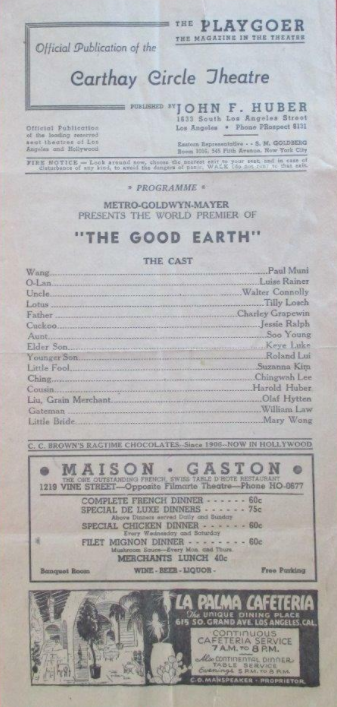
Photos including Bruce Cabot above are from the approximate timeframe of The Good Earth World Premiere, but not from the premiere
— Tim
January 29, 1939
Dinner and a Play with FDR and Errol Flynn
7:45pm – 8:50pm: Dinner at the White House with ER, Household, Errol Flynn, Miss Malvina Thompson, Mrs. Helm
8:50pm – 11:10pm – “Outward Bound” at the National Theater with ER, James Roosevelt, Jr., Errol Flynn, Marguerite A. LeHand , Miss Malvina Thompson, Mrs. Helm, Miss Connochie, Miss Henderson, Mr. and Mrs. Hendrik van Loon
“Tonight all of us are going to see: “Outward Bound.” I have no fear about the evening, for I know that the play, as well as the cast, is among the finest in the theatre today. We are deeply appreciative of the generosity of the cast. They have come down from New York City to give this performance at their own expense for the benefit of the Infantile Paralysis Fund.” – Eleanor Roosevelt
“All of our guests last night sang “Happy Birthday” to the President just as the clock struck midnight, which was a nice beginning for his birthday. All the young movie stars are here today to help him celebrate his birthday by making the birthday balls a success throughout this city.” – Eleanor Roosevelt
This is a play program for President Roosevelt’s birthday celebration in association with The Playhouse Company and the National Theatre Directors. A command performance of “Outward Bound” by Sutton Vane. Directed by Otto Preminger and staring some of the greats like Laurette Taylor, Florence Reed , Helen Chandler and Vincent Price. Preformed at the National Theatre, Washington, D.C. on Sunday evening, January 29, 1939. — with Errol Flynn as a special guest of the President.
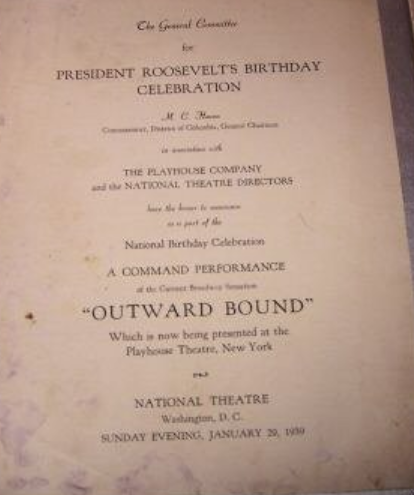
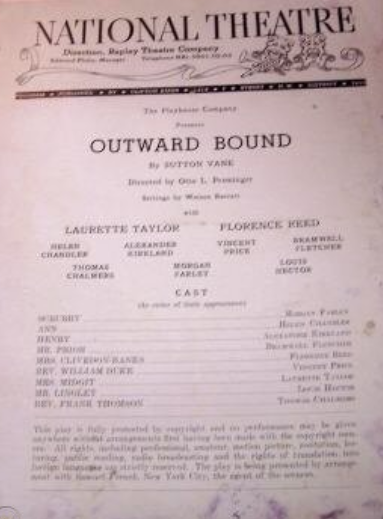
………………………………………………………………………………………………………………..
Birthday Boy Biden Born When FDR was President and Errol Flynn Ruled in Hollywood
When Joe Biden was born, World War II raged. Franklin D. Roosevelt was in his third term as president, Errol Flynn was a Hollywood heartthrob, and Glenn Miller was the top recording artist in the country.
— Tim
January 27, 1949
Louella O. Parsons
Los Angeles Examiner
I couldn’t have been more surprised when a message was left at my house “to hold February 12 for a dinner-dance at the home of Errol Flynn, please.”
Ever since his rift with Nora, Errol g]has been serving few of his old friends and has been giving no parties at all, even though he is one of our finest hosts. But sure enough, the party is on.
I think this is because Errol is really happy making Forsythe Saga and is to be gay and forget his domestic troubles. If he and Greer Garson ever had any disagreements that’s all in the past. He says she is one of the most intelligent, talent and swell girls he has ever worked with.
…
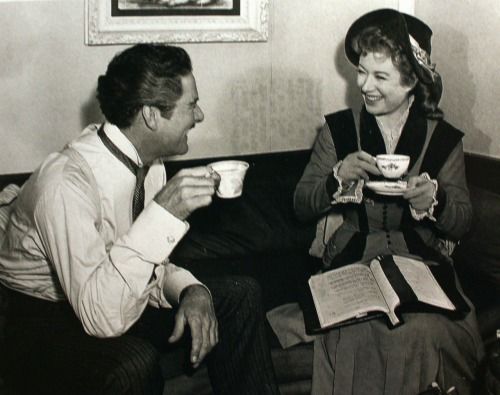
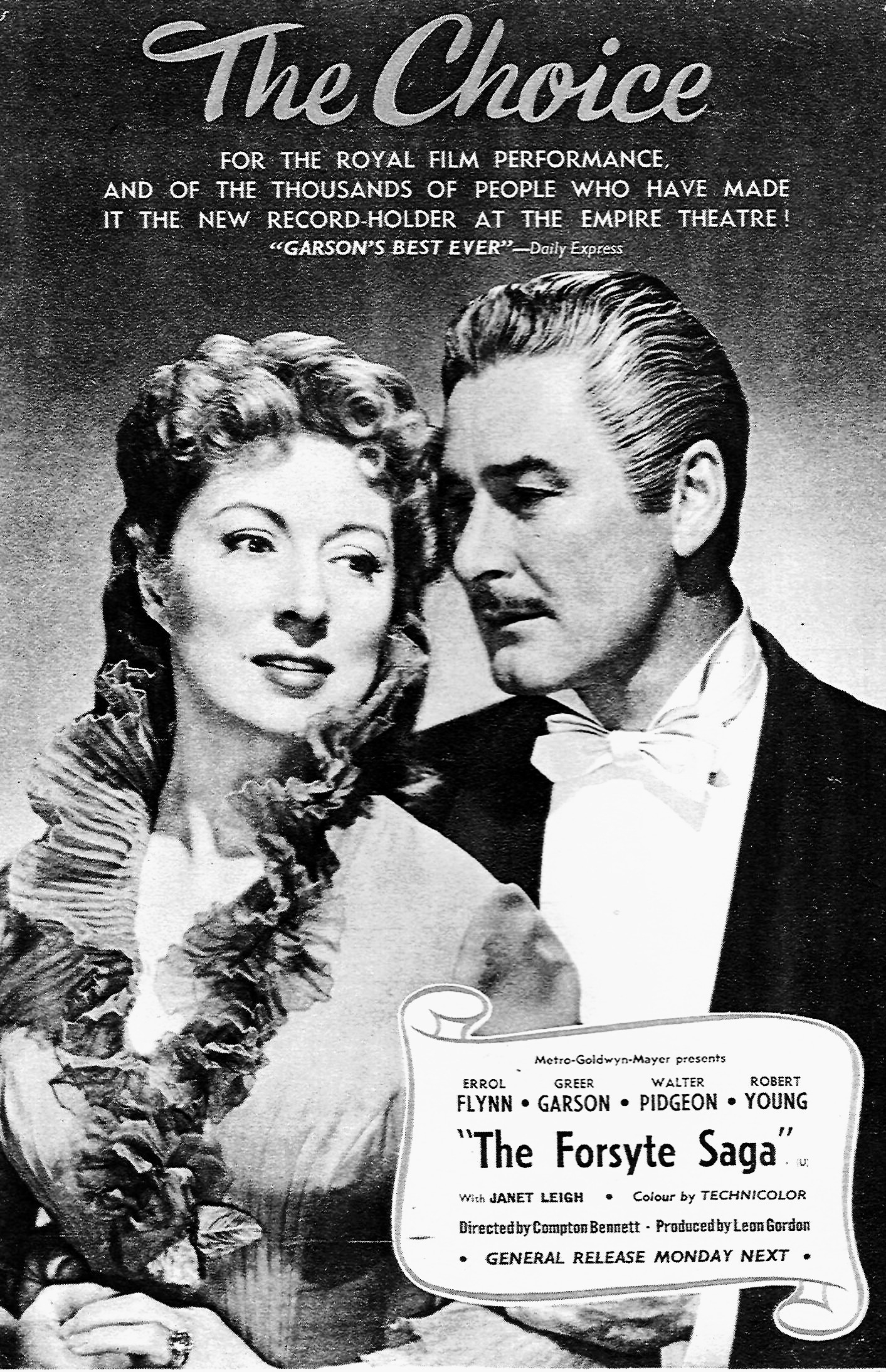
— Tim

The Prince, the Pauper, and the Malarial Superstar (Plus a Sick Director)
January 27, 1937
Harrison Carroll
Evening Herald Express
Errol Flynn is back at work on The Prince and the Pauper after days out with the flu and malaria.
…
January 28, 1937
Elizabeth Yeaman
Hollywood Citizen News
The Prince and the Pauper has been plagued by flu. Errol Flynn, the star, was out of the cast for two weeks with a combined attack of flu and malaria. He finally reported for work on Monday. And todaydirector William Keighley took to his bed with flu. So William Dieterle has been rushed in to complete the picture which should be finished within another week.
…
HISTORY AND DOCUMENTATION OF ERROL’S MALARIA
Part 1
Errol’s Malaria
Part II
Bitten in New Britain
Part III
Recurrences
— Tim
I wish you all smooth sailing…
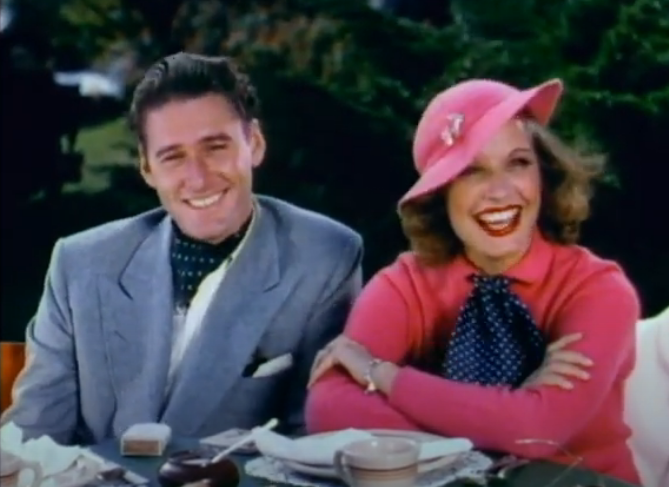
January 23, 1936
Pirate Party on Catalina
Film Daily
With Buddy Rogers and Band, Marion Davies, Cary Grant, Virginia Bruce, John Gilbert, Chester Morris, Lee Tracy, Lili Damita, Errol Flynn, Sid Silvers, Robert Armstrong.
(Musical Review Series)
MGM – 20 Minutes
A STANDOUT
There is more attractive flash, sparkling action and general entertainment in this two-reeler than in some features. Very effectively filmed in Technicolor, it takes the form of of a pirate masquerade party on beautiful Catalina Island, where scores of film stars happen to be present and thus give the film a big-time cast and bif fan interest. Charles “Buddy” Rogers and his orchestra provide the musical background and are an act in themselves. Chester Morris acts as master of ceremonies, doing a nice job of it and working in a number of big bits with Sid Silvers and other performers. The picture has plenty of flash in the way of eye-filling girlies, and things are kept lively by interpolation of aquatic action and a generally rapid succession of novelty numbers and star closeups. Lewis Lewyn produced it.
Pirate Party on Catalina Island (Full Movie)
youtu.be/ZXXTE99ThM0…
…
We’re In the Money – With a Pirate Treasure Chorus Line
…
Buddy Rogers and His California Cavaliers
…
Boatful of Banjos and an Anchors Away Chorus Line – Mickey Rooney on Percussion
…
— Tim